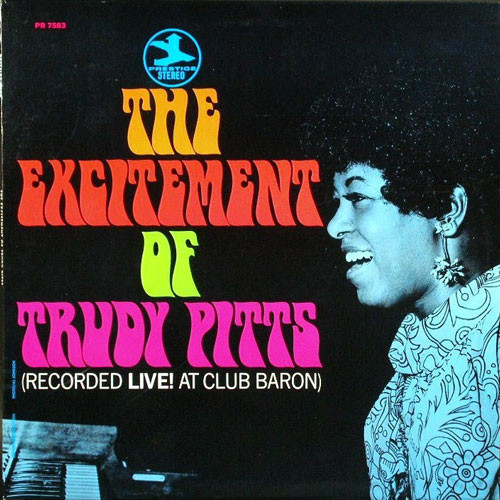Cliché but the veritable truth. Ms. Pitts is nothing short of exciting, especially in a live setting.

Personnel
Trudy Pitts (organ), Wilbert Longmire (guitar), Bill Carney (drums)
Recorded
on May 24, 1968 at Club Baron, New York City
Released
as PRST-7583 in 1968
Track listing
Side A:
Trudy ‘N’ Blue
Never My Love
Side B:
Autumn Leaves
W.T. Blues
At any rate, Pitts furthermore recorded with Pat Martino (El Hombre) and Willis Jackson (Star Bag) and came to be part of the increasingly quirky career of Roland Kirk in the ‘70s, appearing on, among others, Other Folks’ Music, as dryly comical a title as they come.
The title of The Excitement Of Trudy Pitts is a dime a dozen. A matter of insignificance, because it’s the subtitle that counts: Recorded Live At Club Baron. Among the Prestige records of Trudy Pitts, who hailed from the stronghold of organ jazz Philadelphia and was acclaimed for her blues-drenched style, dynamic settings of the organ and foot pedal work and mentored ‘another Scott’, namely the young Rhoda Scott, The Excitement Of Trudy Pitts stands out. Whereas her other records focused on diverse and concise standards and popular tunes, her fourth and final album on Prestige is a full-blown affair of groove and grease.
What’s so alluring about records like The Excitement Of Trudy Pitts is that they give you a feeling of how things went at the tail end of the chitlin’ circuit era, during which clubs offered accessible, soulful musical entertainment to the predominantly black community, which was lining up in clubs in cities like Newark, Baltimore, Pittsburgh, Philadelphia, Syracuse, Chicago, Atlantic City. Hammond organ combos were very popular. Foot pedal style or bass lines on the keyboard obviated the need for a bass player, which was cheaper for club owners. Most of all, crowds were taken in by the multi-dimensional sounds of the organ, which sounded familiarly like church and related to the vocalizing of blues singers.
This time the place is Club Baron in New York City and the aural snapshot is provided by Ms. Pitts, who rocks the joint with the help of guitarist Wilbert Longmire and her other half, Bill Carney. Four tunes, two on each side. Pitts rips and roars through the up-tempo 12-bar blues progression of Trudy ‘N’ Blue. The feeling that she coaxes out of the organ during Never My Love equals the bittersweet yearning of the soul singer and is underlined by a subtle, perky beat.
The other beats that Carney provides are jubilant, groovy, raucous and bring Club Baron to boiling point in combination with Wilbert Longmire’s dirty but nimble-fingered playing style. Autumn Leaves gets a hard-cookin’ treatment and W.T. Blues is the kind of backbeat-heavy blues that induces a couple of slightly inebriated gents and dames to start to point their fingers at what lingers in the middle of their bodies.
Miss Pitts was exciting, remember? To be sure, she is not a cheap sensationalist but gets the message across with plenty of ideas and plenty of skills. Plenty is the word here. As T-Bone Walker once sang, “let your hair down baby, let’s have a natural ball.” Baron had a ball. Wouldn’t you? After five decades, this stuff is definitely still fresh enough to arouse your spirits.
Listen to W.T.’s Blues on YouTube: https://www.youtube.com/watch?v=cCLV9y3tsj0
